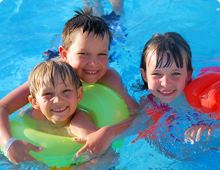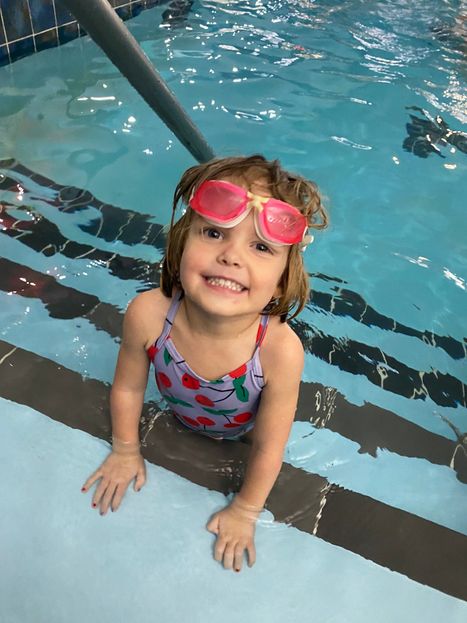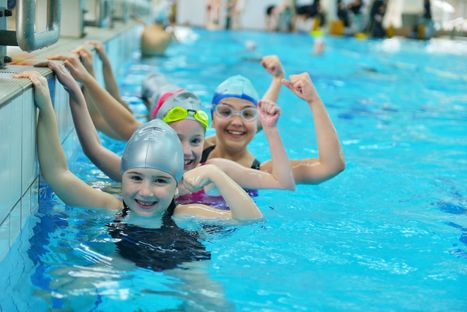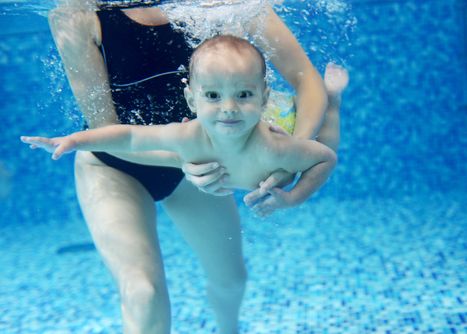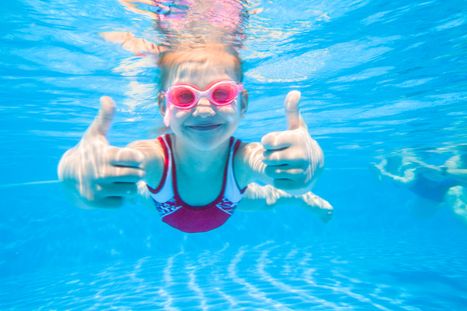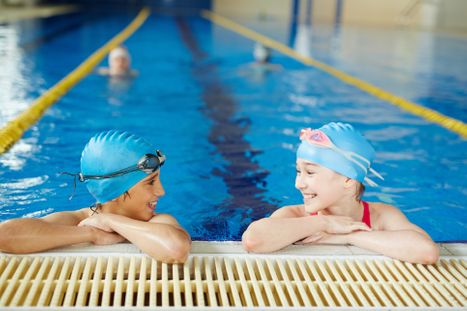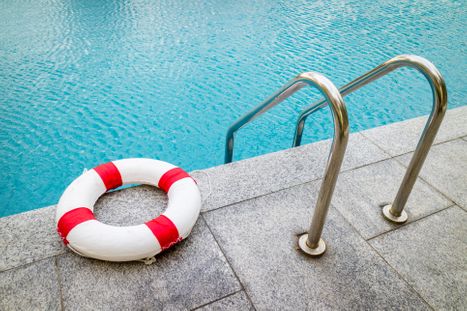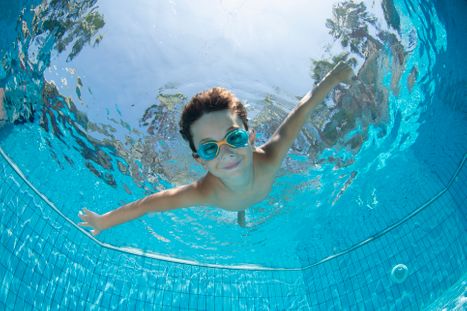Blog
When Should My Baby Start Swimming?
Introducing your baby to swimming is a wonderful way to bond, build confidence, and lay the foundation for essential water safety skills. But when is the right time to begin swimming lessons? Let's explore expert recommendations and research-backed insights to help you make an informed decision.
🏊♂️ The Ideal Age to Begin Swimming Lessons
The American Academy of Pediatrics (AAP) recommends that formal swimming lessons can start as early as age 1, especially for children who are developmentally ready. This guidance is based on studies showing that swim lessons can reduce the risk of drowning by up to 88% for children aged 1 to 4 .
For infants under 1 year, parent-child water play classes can be beneficial for getting babies comfortable in the water.
🌊 Benefits of Early Water Exposure
Introducing your baby to water at an early age offers numerous benefits:
Physical Development: Swimming engages both sides of the body, enhancing motor skills, coordination, and balance .
Cognitive Growth: Early swimming can boost brain development, leading to improved language and literacy skills .
Social and Emotional Benefits: Participating in swim classes can increase confidence and adaptability in various settings .
moreThe Hidden Risks of Floatation Devices Like Puddle Jumpers
At Hudson Valley Swim - Seminole, our mission is to create confident, capable swimmers from the very start. That’s why we want to talk about something we see all too often — young children depending on puddle jumpers, arm floaties, and other flotation aids that actually work against the skills they're trying to build.
Swimming, when broken down to its core, is a horizontal skill — bodies moving smoothly across the water. Flotation devices that keep kids upright can unintentionally teach the wrong habits. They position children vertically, which unfortunately mirrors the natural posture of a person struggling in the water. Instead of learning to glide across the pool, kids in puddle jumpers may learn that staying upright is "normal," even without a life jacket.
Another major concern? These devices create a false sense of security. Children get used to the idea that very little effort is needed to stay afloat, when real swimming requires strength, body awareness, and practice. In a real emergency, a child who has only experienced the support of floaties may panic — instinctively trying to stay vertical instead of rolling onto their back or kicking horizontally to safety.
moreSwim Lessons Improve Your Toddler’s Confidence and Motor Skills
At Hudson Valley Swim Seminole, we believe swimming is about much more than just water safety — it's about building skills that last a lifetime.
For toddlers, swim lessons are a huge opportunity for growth, both physically and emotionally.
Here’s how enrolling your toddler in swim lessons can help boost their confidence and strengthen their motor skills — all while having fun!
1. Confidence That Extends Beyond the Pool
Learning to swim is one of the first big achievements many toddlers experience independently. Each small success — whether it’s blowing bubbles, kicking to a parent, or floating on their own — builds self-esteem.
In every lesson, toddlers learn:
Persistence: It might take a few tries, but with practice, they see progress.
Trust: They build trust with their instructors and learn that it's safe to try new things.
Pride: The smiles after completing a skill say it all — toddlers love mastering new challenges!
This growing sense of "I can do it!" often carries over into other areas of their lives, like trying new foods, climbing new playground structures, or even starting preschool.
2. Boosting Physical Development and Motor Skills
moreSwim Diapers 101 – What Parents Need to Know
At Hudson Valley Swim Seminole, we’re committed to creating a safe, clean, and comfortable environment for all of our swimmers — from our tiniest Pollywogs to our confident Sharks! One important part of keeping our pools clean and safe involves something you might not think about until swim day: swim diapers.
Here’s everything you need to know about swim diaper rules and best practices before you dive into lessons with us!
Why Are Swim Diapers So Important?
Accidents happen — and that’s okay! But accidents in the pool can cause health risks, lesson delays, and even temporary pool closures which can be very expensive. Proper swim diaper use is one of the best ways we can work together to avoid these issues and keep classes running smoothly for everyone.
What Type of Swim Diapers Are Required?
At Hudson Valley Swim Seminole, we require two layers for any child under 3 years old, or any child who is not fully potty-trained:
A disposable swim diaper (like Huggies Little Swimmers or Pampers Splashers) AND
A snug-fitting reusable swim diaper (such as Happy Nappy, iPlay, or Splash About)
It is important to note that regular diapers are NOT allowed in the pool. They are not designed for swimming and will break apart in the water.
moreThe Science of Swim Lessons: Why Start Early?
As parents, we often hear that “kids are like sponges”—and when it comes to learning to swim, that couldn’t be more true. At Hudson Valley Swim in Seminole, we specialize in teaching babies and toddlers because we believe the earlier children start, the stronger, safer, and more confident swimmers they become.
But don’t just take our word for it—science backs it up.
Here’s a closer look at why starting swim lessons early isn’t just cute or fun (though it definitely is)—it’s one of the best things you can do for your child’s safety, development, and confidence.
1. Water Safety Skills Begin Early
According to the American Academy of Pediatrics, formal swim lessons as early as age 1 can significantly reduce the risk of drowning—especially in toddlers, who are naturally curious and prone to accidental water exposure.
By starting early, children begin to build essential skills like:
- Breath control
- Floating
- Back-to-wall movement
- Safe water entry and exit
At Hudson Valley Swim Seminole, these safety skills are gently introduced through play and repetition in our heated indoor pool.
moreDealing with Fear of Water: Tips for Parents and Kids
At Hudson Valley Swim in Seminole, one of the most common concerns we hear from parents is: “What if my child is afraid of the water?” Know this—you’re not alone, and your child’s fear is completely normal.
Whether your little one clings tightly to you during bath time or cries at the sight of a pool, fear of water (aquaphobia) is something many families face. The good news? With patience, consistency, and the right environment, kids can learn to feel confident and safe in the water.
Here are some of our top tips for helping your child overcome fear of water—backed by our years of experience teaching swim to babies, toddlers, and young kids in a nurturing and supportive setting.
1. Start Slow and Stay Calm
Your child takes cues from you. If you’re relaxed and calm around water, it helps them feel safe. Begin with short sessions near the water—like sitting at the pool’s edge or splashing with feet.
Pro Tip: At Hudson Valley Swim Seminole, we offer free trial classes to help ease your child into the water gradually in a low-pressure environment.
2. Keep It Playful
Water play is one of the best tools for overcoming fear. Use bath toys, sing songs, blow bubbles, or pretend to “wash” a doll. Keep it fun and light.
moreFrequency Matters - Multiple Weekly Swim Classes Improves Speed of Learning
When it comes to learning how to swim, consistency and frequency make all the difference. At Hudson Valley Swim in Seminole, Florida, we believe that taking several swim classes per week—especially during summer break—can dramatically improve your child's progress in the water when compared to attending once a week for years.
Accelerated Learning
Swimming is a skill that relies on muscle memory, coordination, and confidence. When children practice more frequently, they retain what they've learned and build upon it much faster. Attending class once a week often means spending lesson time reviewing old skills instead of advancing to new ones. In contrast, swimming multiple times per week reinforces techniques and helps kids progress at a much quicker rate.
Summer is the Perfect Time to Swim More Often
With school out and schedules more flexible, summer is the best time for kids to immerse themselves in swim lessons. More frequent lessons lead to increased comfort in the water, stronger strokes, and improved endurance. Instead of spending years making slower progress, children who swim multiple times per week often become confident, independent swimmers in just a few months. In the summer, children often spend more time in the water so multiple lessons, combined with more practice is a great recipe for faster improvement.
moreBond With Your Baby: Bring Your Baby to Swim Lessons at Hudson Valley Swim Seminole
There’s something truly magical about the moment a baby experiences water for the first time— floating in their parent’s arms, feeling the warmth of the indoor heated pool, and giggling as they splash around. At Hudson Valley Swim in Seminole, Florida, we believe that swimming isn’t just a life skill; it’s a bonding experience that strengthens the connection between parents and their little ones while providing incredible cognitive and emotional benefits for babies.
Creating Lasting Memories Through Water
From the moment parents step into the warm, welcoming environment of our indoor heated pool, they are met with an experience designed to foster trust, comfort, and joy. Water has a naturally soothing effect, and when parents hold their babies close in the pool, it creates a deep sense of security. This bonding moment is more than just fun—it lays the foundation for a lifelong relationship of trust and communication.
At Hudson Valley Swim Seminole, we encourage parents to actively engage in the learning process. By holding their baby, maintaining eye contact, and speaking reassuring words, parents become their child’s first swim instructor. This shared experience strengthens the parent-child bond, creating a sense of teamwork and mutual confidence that extends beyond the water.
moreWhy Hudson Valley Swim Seminole is the Best Choice for Your Little Swimmer
When it comes to introducing your child to the water, finding the right swim school is essential. At Hudson Valley Swim, located inside LA Fitness in Seminole, we specialize in swim lessons for all ages and all swimming levels. Our baby swim classes and our toddler swim classes provide a safe, fun, and effective way for young children to develop confidence in the water. With our indoor heated pool, small class sizes, and expert trainers, we offer the best learning environment for your little swimmer.
Water Safety Matters: Start Swim Lessons Early
Did you know that it only takes 20 seconds for a child to drown? Water safety is a crucial skill that all children should learn as early as possible. The American Academy of Pediatrics (AAP) recommends that children start swim lessons by age one to help prevent drowning and build essential water survival skills. At Hudson Valley Swim Seminole, we create a fun and supportive environment where even the youngest swimmers can learn to feel comfortable and safe in the water.
The Benefits of Baby & Toddler Swim Classes
Enrolling your child in baby swim classes or toddler swim classes isn’t just about having fun—it’s about building vital water safety skills. Early swim lessons help children develop comfort and independence in the water while improving coordination and cognitive development. Our specialized programs focus on gentle water introduction, breath control, floating, and basic stroke techniques tailored to each child’s age and ability.
moreThe Benefits of Swimming for Children's Physical and Mental Health
Swimming is not only a fun and refreshing activity for children but also offers a wide array of physical and mental health benefits. Let's delve into the numerous advantages that swimming provides for children's overall well-being.
Physical Development
· Swimming is a low-impact, full-body exercise that significantly contributes to a child's physical development. It encourages healthy growth and aids in the development of strength, coordination, and balance. Additionally, it equips children with essential water safety skills, making it a holistic exercise for their physical well-being.
Brain Development
· Studies have shown that children who learn to swim earlier reach developmental milestones including speech, literacy, numeracy, and visual-motor skills much earlier than their peers and non-swimmers. Furthermore, swimming can help improve memory, mood, clarity, focus, and sleep, ultimately aiding in stress reduction and improved behavior.
Stress Relief
· The release of endorphins during swimming combats stress hormones, and the rhythmic actions of swimming positively counteract the symptoms of stress. The water's inherent properties also provide a relaxing and stress-relieving environment for children.
moreSaving Lives: A Parent’s Guide to Preventing Childhood Drowning
Drowning is a significant and preventable cause of death among children, with children aged 1-4 being particularly vulnerable. According to a study by the CDC, drowning deaths in the United States have seen an alarming increase, with over 4,500 deaths annually from 2020-2022, indicating a rise in drowning rates compared to previous years.
Alarming Statistics
- Drowning is the number one cause of death for children aged 1-4 in the United States, with the highest drowning rates among this age group.
- The study found that almost 40 million adults (15.4%) in the United States do not know how to swim, and over half (54.7%) have never taken a swimming lesson.
- Particularly concerning is the fact that 63% of Black adults and 72% of Hispanic adults reported never taking a swimming lesson.
Importance of Swimming Lessons
The study revealed a protective association between past participation in formal swimming lessons and the risk of drowning in children aged 1 to 4 years, indicating an 88% reduction in the risk of drowning among those with swimming lessons. This underscores the importance of swimming lessons in preventing childhood drowning.
moreThe Importance of Children Swimming Year-Round for Independence and Summer Safety
Swimming is a crucial life skill for children, offering not only physical and mental health benefits but also instilling a sense of independence and safety, particularly during the summer. According to the Centers for Disease Control and Prevention (CDC) approximately 79% of children spend time near the water during the summer, whether it’s a pool, lake, or a beach. Embracing swimming as a year-round activity for children can significantly enhance their confidence, competence in the water, and ensure a safe and enjoyable summer experience.
The Significance of Year-Round Swimming for Children
Physical Health and Development
- Swimming provides an excellent form of physical exercise for children, promoting cardiovascular health, muscle development, and overall fitness.
- Regular swimming from an early age can contribute to the development of strong motor skills and coordination.
Water Safety
- Year-round swimming enables children to continuously improve their water safety skills, equipping them to handle potential water-related emergencies.
- According to data from the American Red Cross, only 64% of children who spend time near the water in the summer have basic swimming skills. Familiarity with water safety guidelines and practices from regular swimming can significantly reduce the risk of accidents during summer water activities.


